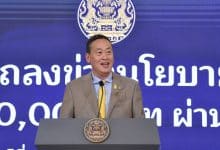Thai anti-corruption body names names over Thai Airways Rolls Royce engine scandal

Part of the debacle Thai Airways finds itself in now harks back to poor decisions made 30 years ago with some “expensive” aircraft engine purchases. Since then there have been numerous investigations and serious charges levelled against Rolls Royce over payments made to Thai Airways personnel.
Rolls Royce has since settled over the case following an investigation by the British Serious Fraud Office in 2016 and 2017. In Thailand, there have been no official investigations over billions of baht of alleged “undeclared payments” that were paid by Rolls Royce to secure the purchase of their Trent-branded engines for new Thai Airways jets at the time.
Now Thai investigative news site, Isranews, says the Thai National Anti-Corruption Commission has declared it has grounds to “support the allegation” that former finance minister Thanong Bidaya broke the law during negotiations to buy Rolls Royce engines for new Airbus jets at the time.
Thanong, who was serving as Thai Airways chairman, and the airline’s adviser at the time of the decisions. Rolls Royce admitted in January 2017 that it had bribed Thai government officials in the 1980s and 1990s so they would buy aircraft engines from the famous British jet engine manufacturer for Thai Airways International.
No action was taken at the time by the Thai NACC. At the time the British Serious Fraud Office found out that Rolls-Royce had agreed to pay 254 million baht to “individuals” to secure a deal with the Thai government, who were majority shareholders of the airline at the time, to purchase Rolls-Royce Trent 800 engines for six Boeing 777 aircraft and Trent 500 engines for seven Airbus A340 aircraft. The A340 aircraft would go on to be one of the most spectacular loss-makers for the national airline.
The NACC voted 6 to 2 to support the claims against Thanong and Kaweepan Ruengpaka, Thai Airways’ former vice president for finances, and that they had breached Sections 8 and 11 of the State Employees Offences Act. The offenders, if found guilty, would have been liable for between five to 20 years in jail, a fine from 2,000 to 40,000 baht, or both.
But, in both cases, the statute of limitation has since expired.
The NACC has already decided to formally accuse ten out of 26 men linked to the Rolls-Royce bribery scandal.
The NACC probe and adjudication come five years after Rolls-Royce admitted misconduct to the British Serious Fraud Office in 2017. At the time, it was revealed that the bribes reached over 1.25 billion baht and were paid to secure Thai Airway’s purchase of Rolls-Royce Trent 800 turbofan engines.
At the time, Jet engine manufacturer Rolls-Royce agreed to pay an equivalent of 28.5 billion baht to settle bribery and corruption charges brought by the British, US, and Brazilian governments. The case proved there had been “bribery in Thailand,” but the British Serious Fraud Office said there had been a Thai complaint filed and that no details were provided by the Thai government or Thai Airways. From the 2017 report…
“Some of the money was for individuals who were agents of the State of Thailand and employees of Thai Airways.”
Thai Airways never financially recovered from the huge outlay it made for the Rolls-Royce engine and the scandal kicked off two decades of poor performance, followed by crippling losses.
Thai Airways has been in bankruptcy administration since September 2020 after filing for bankruptcy protection in May 2020. The airline eventually buckled under the pressure of nearly US$10 billion in debts amid the world’s border closures from the Covid-19 pandemic.
SOURCE: Isranews | Bangkok Post
Latest Thailand News
Follow The Thaiger on Google News:


























